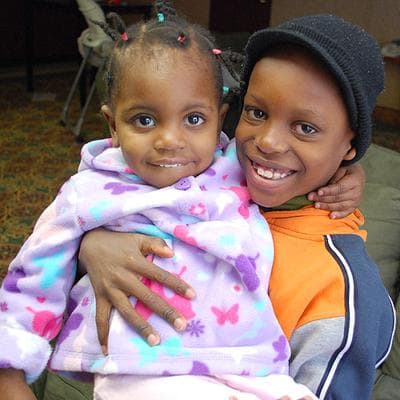Advertisement
Haitian Earthquake Victims Struggle To Survive In Greater Boston
Resume
Most people affected by Haiti's January earthquake aren't eligible to come to the United States. But one group — Haitian mothers with small children here on short-term tourist visas — has managed to come to Boston, making social service providers worried.
Alide Honore stands knee high and wears her hair in little puff balls sprouting from her head.
The two-year-old follows her somewhat anxious mother around the room, gazing up at her with big brown eyes. This baby seems helpless, but she holds a powerful trump card — an American passport.
"The American Embassy called looking for her," says Marie Honore, 37, in Haitian Creole.
The U.S. Marines offered to transport Alide to the United States. It was just days after the earthquake, and very difficult to leave Haiti. Problem was, little Alide can barely walk, much less travel alone. So, according to Honore, U.S. officials offered her a six-month tourist visa to accompany her daughter. But she had to leave her Haitian-born son behind.
Once in Boston, the family stayed at a friend's house, where mother and baby slept on cardboard lining the floor.
"I was afraid that my child would get sick because of the condition in which I was living," Honore says.
That friend eventually asked them to leave, saying it was just too uncomfortable cramming so many people in the apartment. So, Marie and her baby hopped around homeless shelters, until they were moved to a Holiday Inn in Woburn.

Here, homeless women with babies share a meeting room strewn with toys. Alide sits quietly on a couch while a woman on the other side of the room yells at her son, "Be quiet! Fix your face! Fix your face!"
The Massachusetts Department of Housing and Community Development is paying for the Honores to stay here. And it's just in time.
Florel, Honore's Haitian-born son, joined her last week. The seven-year-old boy entered with a pre-existing tourist visa, accompanied by a family friend, traveling through the Dominican Republic.
Honore has no money or authorization to work. Her only income is $200 in food stamps and $239 in cash assistance each month. That's all thanks to her American-born daughter.
Even though she's broke, Honore says this is still better than being in Haiti.
"Everything that I had was destroyed, and I still do not know if my husband is alive," Honore says.
So far, social service agencies have counted more than 100 adults in Boston like Honore. Marjean Perhot heads immigrant and refugee services for Catholic Charities of the Archdiocese of Boston. Perhot says most are women with very young children, and they are staying with family. She worries about the strain this will put on their hosts, since these visitors can't pay rent.
Roseline St. Pierre knows what that's like. She and her American-born daughter are staying with St. Pierre's brother — seven people in a three-bedroom apartment. St. Pierre complains about the cold, and wears a down coat even when she's inside. Before the earthquake, she ran a small grocery store in Port-au-Prince. Now she spends her days in Cambridge doing nothing.
"Back in Haiti, I was an empowered woman. But now I have to rely on other people," St. Pierre says.
As frustrated as she is, St. Pierre says she's hoping to renew her visa when it expires in July.
That worries Mark Krikorian. He runs the Center for Immigration Studies, a Washington think-tank that favors stricter controls on immigration.
"There's no reason that these women can be given or should be given permanent long-term status just because they had a kid here," Krikorian says. "That really does create a powerful incentive to sneak into the United State or lie in a visa interview."
But Marie Honore and Roseline St. Pierre say they don't want to stay here permanently, just until it's safe to go back home.
Now that commercial flights are flying to Haiti again, state officials say they expect more desperate women and children will be on their way here and needing help.
This program aired on March 3, 2010.